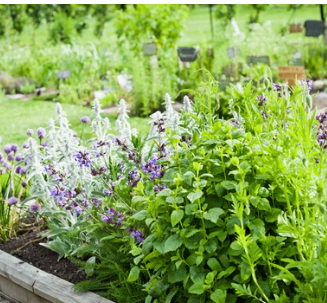Healthy Herbs With Amazing Powers That Should be in Your Meals -- and in Your Garden
Common herbs with uncommon powers of healing and prevention. Learn the power of these herbs that you can easily incorporate into your diet and meals.
If you're trying to improve your health -- improve your life -- and looking for ways to improve your diet beyond some of the other strategies mentioned in some of my other articles, this article can help. Instead of talking about what foods to eliminate or what foods to add, we'll focus more on what you should use to enhance the foods you're cooking to make your meals more delicious and nutritious.
The herbs described here -- common herbs with uncommon powers of healing and prevention -- contain phytochemicals (including flavonoids, terpenoids, monophenols, saponins, and flavones), which are good for protecting cells from damage caused by free radicals, and are believed to help slow the aging process and reduce the risk of many diseases, including cancer, heart and cardiovascular disease, stroke, high blood pressure, cataracts, osteoporosis, and urinary tract infections. They are also useful in treating asthma and allergy symptoms.
When used in combination with a healthy diet and lifestyle, these healthy herbs can improve overall health, be a first line of defense against cancer, and help increase cardiovascular wellness.
Furthermore, if you take it one more step and actually grow these herbs in your garden (or window sill), you'll get the added benefit of feeling good about growing some of the food you eat -- knowing that your herbs are safe and organic.
Common Herbs with Uncommon Powers of Healing and Prevention
Here's our alphabetical list of the best herbs -- healthy herbs -- that should be in your meals and in your garden.
Basil. Part of the Lamiaceae family, basil is rich in essential oils that contain the fatty acids of terpenes, a substance that essentially encourages cancer cells to kill themselves. In the past, basil has also been used as an aphrodisiac, and as a remedy for melancholy and depression.
Coriander. Part of the Apiaceae family, coriander (also known more commonly as cilantro) is rich in phytonutrients and flavonoids, which produce anti-inflammatory properties as well as cholesterol-lowering abilities. It has been used for the relief of anxiety and insomnia, as well as a digestive aid.
Garlic. Part of the allium family, garlic (the super herb) has allicin, a strong antioxidant and anti-inflammatory flavonoid that has anti-hypertensive, anti-microbial, anti-biotic, anti-parasitic, and anti-viral characteristics that has been labeled "Mother Nature's defender." Garlic helps to lower hypertension, serum triglyceride, and cholesterol levels. More than 30 medicinal compounds have been identified in garlic.
Mint. Part of the Lamiaceae family, mint was originally used as a medicinal herb to treat stomachaches and chest pains -- and today is still used to ease digestive discomfort. It has essential oils that contain perillyl alcohol, which has been shown in studies on animals to prevent the formation of many types of tumors and cancers. Peppermint is one of the most widely used mints and is a hybrid species of mint -- a cross between watermint and spearmint.
Oregano. Part of the Lamiaceae family, oregano is rich in essential oils, with a high content of phenolic acids and flavonoids, that help to get rid of cancer cells. Oregano oil and leaf are both strong herbal anti-bacterial agents due to the high thymol content.
Parsley. Part of the Apiaceae family, parsley has high amounts of the flavonoids apigenin and quercetin, which like most flavonoids, have antioxidant, anti-inflammatory, and anti-tumor properties -- and can inhibit angiogenesis -- the growth of blood vessels that supply tumors with nutrients. They are also good for protecting damage from free radicals, improving cardiovascular and heart functions, as well as useful in dealing with allergies.
Red Onions. Part of the Allium family, red onion has quercetin, a strong antioxidant and anti-inflammatory flavonoid. Studies have found that quercetin may help to prevent cancer, especially prostate cancer, as well as help minimize fatigue, depression, and anxiety. Onions help to lower hypertension, serum triglyceride, and cholesterol levels.
Rosemary. Part of the Lamiaceae family, rosemary is rich in essential oils that contain the fatty acids of terpenes, a substance that essentially encourages cancer cells to kill themselves. Rosemary also contains carnosol, a powerful antioxidant and anti-inflammatory. In the past, rosemary was placed under beds so that the aroma could help keep away bad dreams.
Sage: Part of the Lamiaceae family, it is closely related to rosemary -- and the two are often considered “sister herbs.” It has the potential ability to improve brain function, lower inflammation, prevent chronic diseases, boost the immune system, regulate digestion, alleviate skin conditions, strengthen the bones, slow the onset of cognitive disorders.
Summer Savory. Part of the Lamiaceae family, summer savory was used in the past as a digestive aid for flatulence and colic, as well as a general tonic and for the prevention of diarrhea. It has antioxidant, and anti-inflammatory, and anti-tumor properties -- and can inhibit angiogenesis -- the growth of blood vessels that supply tumors with nutrients.
Thyme. Part of the Lamiaceae family, thyme is rich in essential oils that help to get rid of cancer cells. It has high amounts of the flavonoid apigenin, which like most flavonoids, has antioxidant, anti-inflammatory, and anti-tumor properties -- and can inhibit angiogenesis -- the growth of blood vessels that supply tumors with nutrients.
Other Great Herbs to Use in Cooking
These herbs all also have amazing health benefits, but are a bit more difficult to grow or cultivate, so while you may not be able to grow these in your garden, you should definitely be buying them and adding them to your cooking.
Cardamom: an aromatic spice with a distinctive flavor that complements both sweet and savory dishes. This spice is made from the seeds of several plants in the genera Elettaria and Amomum in the family Zingiberaceae (same as ginger). It has both anti-inflammatory and antibacterial properties. Cardamom benefits may also boost heart health and oral health.
Cayenne Pepper: amazing effects on the circulatory system, great for digestive health, and helps kill cancer cells in the prostrate while also increasing heart health. It belongs to the Solanaceae or nightshade plant family (which also includes tomatoes and eggplant). Benefits include reducing inflammation and digestion aid. It contains Vitamin C, Vitamin A, Vitamin B6, and Vitamin K.
Cinnamon: a spice prized for its flavor (especially in baking) and for its medicinal properties. Research suggests that it may help manage blood sugars, protect against heart disease, and reduce inflammation.
Cumin: rich in iron and good for the digestive system and keeping the immune system healthy, and can boost the power of the liver's ability to detoxify the body
Ginger: the most potent anti-cancer and anti-inflammatory foods, playing a role in lowering LDL cholesterol and slowing -- or even preventing -- cancerous tumor growth
Hawthorn: with high amounts of bioflavonoids, has amazing benefits to the cardiovascular system, improving blood flow through the heart arteries while preventing plaque buildup
Hemp Seeds: are a rich source of protein, fiber, and healthful fatty acids. They may also have antioxidant, anti-inflammatory, and neuroprotective effects, as well as benefits for heart, skin, and joint health
Marjoram: helps in fighting asthma and headaches as well as soothing the stomach and digestive tract. Antioxidants may also promote healthy arteries and heart by preventing cholesterol buildup and improving blood circulation
Mustard Seeds: part of the cancer-fighting cruciferous plant family, containing phytonutrient compounds that protect against gastrointestinal cancer
Scallions: contain powerful antioxidants to help stimulate immune responses, inhibit blood clotting, fight heart disease, and battle cancer cells and viruses
Stevia: the sweetest herb in the world, and an extremely healthy replacement for sugar, that also acts as a general tonic that increases energy levels and mental acuity while aiding digestion
Turmeric: has potent anti-inflammatory properties (more powerful than Vitamin E), helps in fighting Crohn's disease, rheumatoid arthritis, cancer, and Alzheimer's disease
Final Thoughts on Healthy Herbs
By adding new spices and flavorings to your cooking and meals, you can dramatically increase your health and give your body powerful weapons to fight internal diseases (such as cancer and heart disease) and invading diseases (such as viruses and the flu).
Medicinal and Healing Herb Links and Resources


Dr. Randall Hansen is an advocate, educator, mentor, ethicist, and thought-leader... helping the world heal from past trauma. He is founder and CEO of EmpoweringSites.com, a network of empowering and transformative Websites, including EmpoweringAdvice.com.
He is the author of the groundbreaking Triumph Over Trauma: Psychedelic Medicines are Helping People Heal Their Trauma, Change Their Lives, and Grow Their Spirituality and the well-received HEAL! Wholeistic Practices to Help Clear Your Trauma, Heal Yourself, and Live Your Best Life.
Dr. Hansen's focus and advocacy center around true healing ... healing that results in being able to live an authentic life filled with peace, joy, love. Learn more by visiting his personal Website, RandallSHansen.com. You can also check out Dr. Randall Hansen on LinkedIn.




